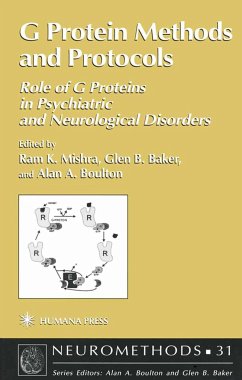
G Protein Methods and Protocols
Role of G Proteins in Psychiatric and Neurological Disorders
Herausgegeben: Mishra, Ram K.; Baker, Glen B.; Boulton, Alan A.

PAYBACK Punkte
57 °P sammeln!
03490-9, Hardcover, April 22, 1997,G PROTEIN METHODS AND PROTOCOLS: Role of Proteins in Psychiatric and Neurological DisordersEdited by Ram K. Mishra, McMaster University, Hamilton, Ontario, CanadaGlen B. Baker, University of Alberta, Edmonton, CanadaAlan A. Boulton, University of Saskatoon, CanadaCombining the cutting-edge insights of leading basic and clinical investigators, G Protein Methods and Protocols provides both critical reviews and detailed protocols for studying the medical role played by G proteins and signal transduction in mental and neurological disease. The psychiatric and neu...
03490-9, Hardcover, April 22, 1997,
G PROTEIN METHODS AND PROTOCOLS: Role of Proteins in Psychiatric and Neurological Disorders
Edited by
Ram K. Mishra, McMaster University, Hamilton, Ontario, Canada
Glen B. Baker, University of Alberta, Edmonton, Canada
Alan A. Boulton, University of Saskatoon, Canada
Combining the cutting-edge insights of leading basic and clinical investigators, G Protein Methods and Protocols provides both critical reviews and detailed protocols for studying the medical role played by G proteins and signal transduction in mental and neurological disease. The psychiatric and neurological disorders covered range from Parkinson's disease and schizophrenia to manic depression, drug addiction, and mood and anxiety disorders. The protocols contain the latest methods and techniques for G protein analysis and application in research related to the central nervous system.
This new work marks a novel departure from books focused narrowly on the physical properties of G proteins in isolation. By providing detailed methods and techniques, this volume's front-line contributors bring out the implications of G protein signal transduction for psychiatric and neurological disorders. Practical and authoritative, G Protein Methods and Protocols will surely prove a major practical resource for all neurochemists, neurologists, molecular biologists, pharmacologists, and psychiatrists seeking to study and better understand these disease states.
G PROTEIN METHODS AND PROTOCOLS: Role of Proteins in Psychiatric and Neurological Disorders
Edited by
Ram K. Mishra, McMaster University, Hamilton, Ontario, Canada
Glen B. Baker, University of Alberta, Edmonton, Canada
Alan A. Boulton, University of Saskatoon, Canada
Combining the cutting-edge insights of leading basic and clinical investigators, G Protein Methods and Protocols provides both critical reviews and detailed protocols for studying the medical role played by G proteins and signal transduction in mental and neurological disease. The psychiatric and neurological disorders covered range from Parkinson's disease and schizophrenia to manic depression, drug addiction, and mood and anxiety disorders. The protocols contain the latest methods and techniques for G protein analysis and application in research related to the central nervous system.
This new work marks a novel departure from books focused narrowly on the physical properties of G proteins in isolation. By providing detailed methods and techniques, this volume's front-line contributors bring out the implications of G protein signal transduction for psychiatric and neurological disorders. Practical and authoritative, G Protein Methods and Protocols will surely prove a major practical resource for all neurochemists, neurologists, molecular biologists, pharmacologists, and psychiatrists seeking to study and better understand these disease states.














